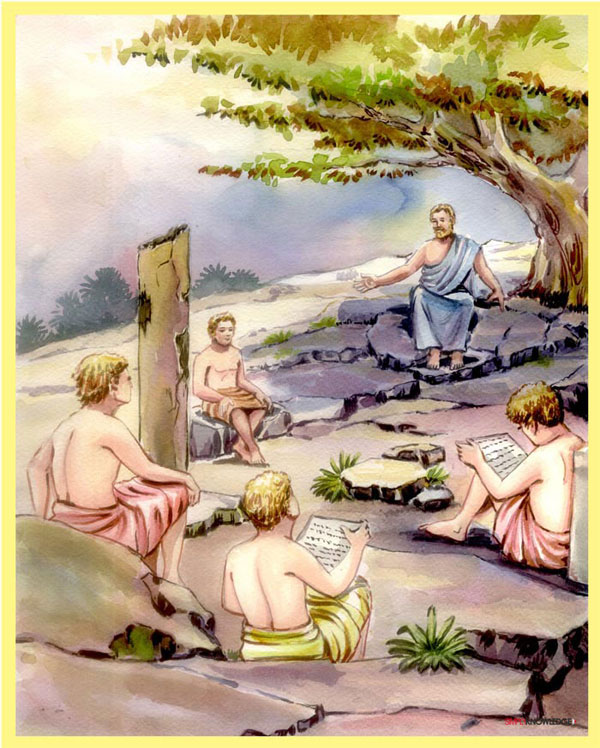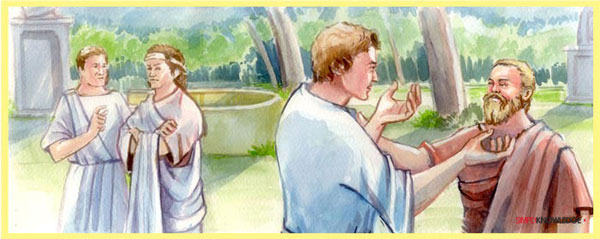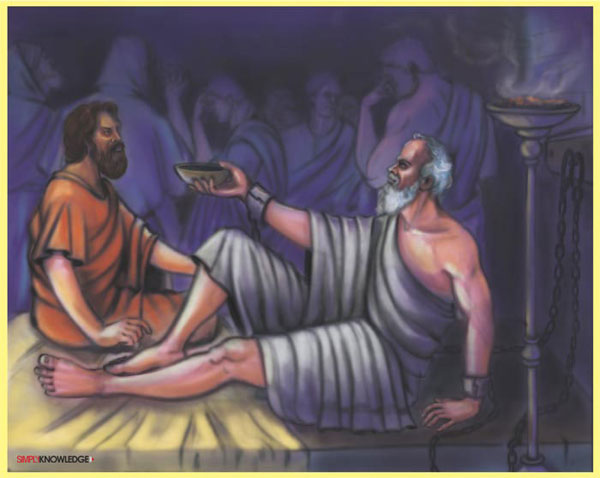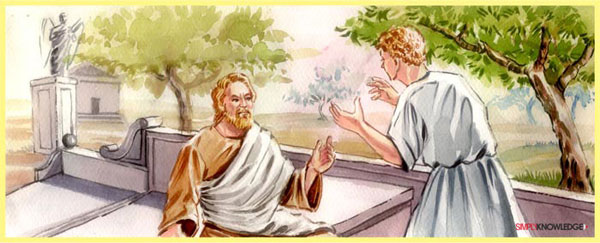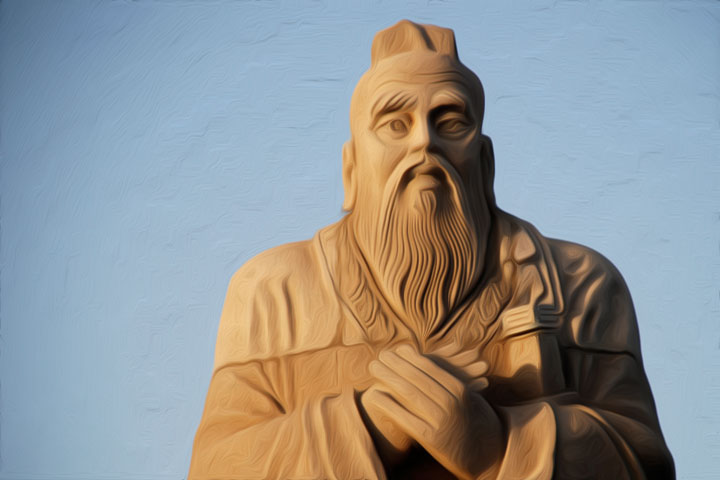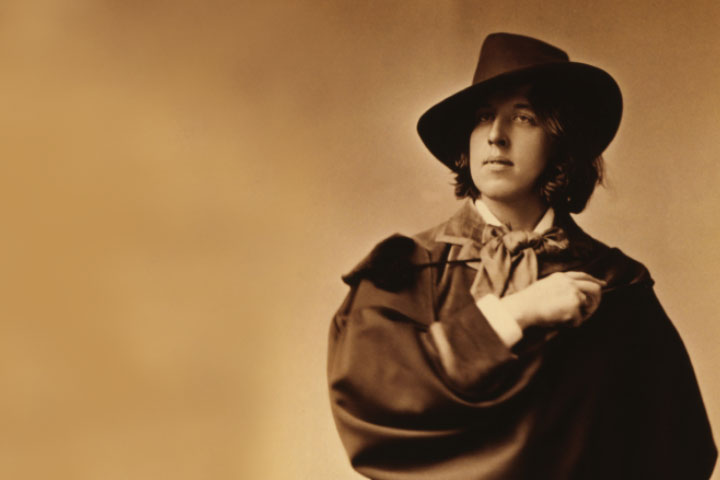
Introduction
“There are only two people who can tell you the truth about yourself - an enemy who has lost his temper and a friend who loves you dearly,” said Antisthenes, when once told that somebody whom he believed, had overstepped all acceptable boundaries of society. And this outburst was aimed at none other than his teacher and the great Greek thinker-Socrates.
Antisthenes was not among the most favourite students of Socrates since they both differed in their thoughts in many ways. Yet, his tirade against Socrates that caused him to say these words proves he revered and cared for his eccentric master. And these words reflect the depth of Antisthenes’ thoughts: While the words are a paradox since they compare an enemy with a beloved friend, they also imply that truth is difficult to find. His words serve as a classic example of his unique thoughts, which eventually made him eminent as the father of the Cynicism, despite being born in an underprivileged family.

Birth
Renowned ancient historian and chronicler Diogenes Laertius, in his record ‘Lives of Ancient Thinkers’, states, Antisthenes was born in 450BC in Athens. His parentage is obscure, with at least two legends prevailing within various schools of thoughts about his lineage. However, the common belief is, Antisthenes was born of an Athenian father and a Thracian mother that were not considered worth significant mention in ancient Greece.
His mother is believed to have worked as a domestic helper or a slave. Due to her Thracian origins and prevailing Athenian laws, Antisthenes was never accorded Athenian citizenship. It is speculated that Antisthenes was an illegitimate progeny, born outside wedlock to an Athenian master and his female Thracian serf. As a result, his birth and childhood were never recorded clearly, unlike those of Socrates’ other students such as Plato and Xenophon, who came from aristocratic families.

Life
Due to his impecunious lineage, Antisthenes led a life of struggle, since his childhood. Due to discriminatory praxis of Athenian rulers, he was forced to study in schools meant for children of foreign slaves and other indigent classes that resided in Athens during the era. Being an exceptional learner, Antisthenes was resentful against the wealthy and ruling classes of Athens.
A reticent Antisthenes however found a great teacher- Gorgias- a famous Sophist. During that period, Sophists, who advocated abolition ancient Athenian rules including discrimination within the population on basis of lineage, wealth and place of origin, were popular among the masses. Rulers feared Sophists due to the sway they held over commoners and hence, were capable of stirring a popular uprising. Antisthenes was enamoured by Gorgias and the Sophists. Gorgias taught the young Antisthenes, the art of rhetoric and other valuable skills that were to help the budding thinker later. With Gorgias and the Sophists, he found common cause: the need to reform the society. Once, he was criticized by an Athenian noble for trying to pursue higher studies, despite his proletarian lineage. Antisthenes replied the noble saying: “Nor were they both wrestlers but yet I am a wrestler,” to insinuate that parentage did not determine an individual’s quest for knowledge or choice of profession.
Ignoring the scorn of Athenians, Antisthenes continued to seek higher education and knowledge. At the time, Socrates was rising to eminence as an eccentric and odious yet innovative and venerated teacher in Athens. The allurement of Socratic teachings proved too compelling for Antisthenes, who went to see the great teacher in action, during one of his fabled public meetings.

Meeting with Socrates
Enchanted by Socrates’ tirade against rulers who claimed to be “wise” without possessing knowledge, Antisthenes met the great master and expressed his wish to join him as a student. The eccentric Socrates, elated at finding a new, ardent follower, welcomed Antisthenes immediately. His acceptance by Socrates caused discomfiture of other disciples such as Plato and Xenophon, among others- who were of aristocratic lineage: They felt it belittling to be peers with Antisthenes whose family was considered alien and insignificant in ancient Athens.

Antisthenes and Socrates
Antisthenes followed Socrates ardently, much to the chagrin of Plato. Antisthenes would be particularly pleased when his master launched tirades against the “wise men.” He quickly mastered the art of ‘Gadfly’ or what is now called the ‘Socratic Method’ of questioning a person to gauge the depth of their knowledge about any particular topic, till the person ran out of responses and acknowledged the extent of his learning was limited.
Antisthenes’ identified with Socrates’ thoughts and propounded them with equal zeal, causing the master to spend long hours with his new student. Xenophon documents Antisthenes as having attained an important position within Socrates’ inner clique, though not as his favourite student.
Having Antisthenes in the higher echelons of Socrates’ group piqued Plato to an extent; he spared no effort to vent his rancour. Once, when Plato was abusing him before other students, Antisthenes responded to Plato’s invective saying: “It is a royal privilege to do good and be ill spoken of,” in apparent reference to his own poverty and Plato’s aristocratic lineage.
Historians also document that Plato berated Antisthenes at every available opportunity.

Antisthenes leaves Socratic school
Antisthenes was present by the side of Socrates during the master’s execution in 399BC; a historic event at which Plato was conspicuously absent claiming to be indisposed, according to the records of Xenophon, who also witnessed the teacher die from a fatal dose of Hemlock.
Xenophon credits Antisthenes as having felt genuine grief and loss over Socrates’ death and bereaved the master and vowed to wreak vengeance against his prosecutors - an oath he fulfilled later.
He had no illusions about being Socrates’ successor, having formed his own thoughts based on Socratic teachings. With the master dead and Plato’s hatred festered, Antisthenes left Socrates’ school, believing it would follow Athenian mores of ethnic discrimination.

The Cynic school is born
Antisthenes, by now armed with Socratic thoughts, Sophist principles and his doctrines began teaching from the Cynosarges gymnasium, on the periphery of Athens.
A bulk of Antisthenes’ doctrine originates Socratic teachings. Antisthenes preached that virtue can be taught and is not inherent, adding that only those who are virtuous qualify as nobles: an apparent affront to Plato and other peers of aristocratic lineage, who had mocked him at Socrates’ school due to his humble antecedents.
Antisthenes quoted his master Socrates as an epitome of virtue. He taught the characteristic of being virtuous leads to copious contentment and happiness, as was amply demonstrated by Socrates through his eccentric yet simple life. Antisthenes further preaches that virtue is a successful culmination of good deeds that can be achieved without proclamation of noble intentions and sans immense learning. Thus, a wise person is self-sufficient, content and happy.
Surprisingly, books by chronicler Diogenes Laertius and peer Xenophon contain a few conflicting accounts about Antisthenes’ Cynic preaching. Antisthenes allegedly defends people having a bad reputation and compares it with physical hardship. Antisthenes possibly attempts to personify Socrates who was considered a stark lunatic and iconoclast by many due to his rants against Athenian definitions of knowledge and wisdom, during his life.
Antisthenes propounded that the laws of virtue, which allow for persons to be gauged by their actions, should be enforced rather than laws of the land - or those accepted by the population - which aims at punishing violators. The laws of virtue, he believed, would galvanize people into performing good deeds and become wise.

Antisthenes on marriage
While no records of Antisthenes having married or having children exist, he preached extensively on this subject. His teachings are however considered controversial, since Antisthenes said only virtuous men and women should marry and have progenies, who would be nurtured appropriately to develop into wise adults. A disciple once asked Antisthenes about an ideal marriage. The teacher responded saying: “If she's beautiful, you'll not have her to yourself. If she's ugly, you'll pay for it dearly. ” Antisthenes was not referring to physical beauty, as his quote would wrongly convey.
Instead, his connotation of ‘beautiful’ was a virtuous woman, who would actively serve of uplifting the society and hence, would have to break away from the accepted practice of remaining a housewife. Hence, “. . . not have her for yourself” is not to cast aspersions that a beautiful woman would philander, by the corollary between beauty and virtue.
He emphasised this preaching further saying, only wise people would appreciate love while others would exploit it for their personal gains. “Quarrels often arise in marriages when the bridal gifts are excessive,” Antisthenes said, while condemning the ancient practice of dowry, which he considered evil.

Psychological teachings of Cynics
Cynicism deals with the basic human psychology and desire to live a simple, carefree life, with subtle blend of altruism and reason. While Cynical teaching focused around virtue and wisdom, Antisthenes followers often tried to proselytize Athenians by accosting individuals or groups on streets and public places.
Cynics would then engage them in the infamous ‘Gadfly’ or intricate quizzing of people about their knowledge till they admitted whatever they had learnt was incomplete - the classical technique perfected by Antisthenes’ teacher, Socrates. Antisthenes and his small group of followers would then lecture these groups or individuals on their false beliefs while preaching the Cynic way of life of ‘Anaideia’ or shameless behaviour, with scant regard to prevalent traditions and propriety.

Controversies over Cynical psychology
While Antisthenes and his motley Cynics extolled virtuous life attained through contentment, self sacrifice and breaking away from accepted dogmas, they behaved like dogs. Indeed, the word Cynic, in ancient Greek, meant ‘like a dog’. They portrayed themselves as penurious nomads by emulating archetypal stray canines.
Cynics were iconoclasts and threw decency to the winds, flagrantly violating propriety by performing various objectionable acts in public. Antisthenes and his clan targeted spiritual leaders, denigrated religious ceremonies and flouted all traditions to highlight their content for conventions. These acts were predominantly aimed at Athenians, since the spiritual decadence was ravaging the otherwise halcyon citizens, who were seeking solace through alternate forms of divine sanctity.

Did Antisthenes truly father Cynicism?
The question is open for debate till date. Some historians believe, some form of Cynicism prevailed, albeit in a disorganised manner, much before Antisthenes propounded it on large scale. Historians and thinkers from the era after the death of Emperor Alexander the Great of Macedon, credit Antisthenes with founding Cynicism only as a point of reference, to validate historical evidence of its existence.

Cynicism as a cult
Athenians were disenchanted following the Peloponnesian War which Athens lost. The placid city came under the rule of the despotic Thirty Tyrants whose reign was plagued by anarchy. Bereaving the loss of young men in the countless battles against archenemies Sparta and Persia, nihilism was rampant among Athenians. Cynicism filled the void but was not devoid of controversies.
Cynicism provided a much welcome and refreshing change from the humdrum and orthodox Athenian beliefs. Antisthenes and his Cynics soon grew into a cult. Despite overt disregard for prevailing traditions, Athenians found the basis of Cynicism lay in altruistic benevolence for their compatriots attainable through detachment from conventional materialism, through liberation of the mind from accepted norms and acts of benevolence.

Other works of Antisthenes
Diogenes Laertius, the ancient Greek historian credits Antisthenes as authoring 10 volumes about Cynicism, albeit in some he harshly condemns his former peers, Plato and Xenophon for their vituperation of his thoughts. Most of these works were lost over the centuries.

Cynic goes English
The term ‘cynic’ is commonly used in the English language. English dictionaries define a cynic as a person who believes that selfishness is the key motivator for all human actions: In stark contrast to Cynicism, which stood for altruism and a life free of material desires.
Next Biography





